Readings in Humanistic Psychiatry
Implications of the Emerging Model
Hanging on to the old chemical imbalance model of mental illness certainly makes everything a lot simpler. The emphasis of treatment is to find the right drug - or combination of drugs - to correct the imbalance. The thrust of research is simply to develop new drugs that will do a better job of imbalance correcting. Kind of makes a person want to invest in pharmaceutical stocks doesn't it? But the wonderful outcomes portrayed in the glossy drug ads are rarely encountered in our increasingly overburdened mental health systems.
Things become a lot more complicated if one accepts the basic tenants of the emerging model of mental illness. Changing core beliefs around what it means to be mentally ill leads to reappraisal of a wide variety of related issues. We'll have to reconsider the roles of medications, social programs, living situations, therapies, and a broad range of activities in promoting recovery from these disorders. Our ideas about patient rights and personal responsibility will shift when the underlying assumptions do. Even the very meaning of recovery must be looked at with a fresh perspective.
The things that we are learning about fetal brain development will affect the way we care for pregnant mothers. Emotional trauma, toxins, infections, and changes in the intrauterine hormonal environment during childbearing can all affect the way the brain develops, and the likelihood that the child will become mentally ill at a later time. We can anticipate that more enlightened societies of future humans will pay much more attention to the chemical environment that is provided in the womb as its babies develop.
The wealth of information now available about the workings of these various brain structures in mental illness is more than one human can comprehend. Even a casual Internet search can lead us in all sorts of different directions, with references to proteins, genes, neurotransmitters, and even brain structures that will be new to almost all of us- and quickly forgotten if they aren't used regularly. It's very easy to get lost in the details.
These disorders are now being seen as resulting from basic problems in the ways key brain areas are structured and connected. These parts of the brain are involved in creating an infinitely complex, moment- to- moment representation of reality complete with emotions, motivations, imagination, self representations, memories, and behavioral responses.
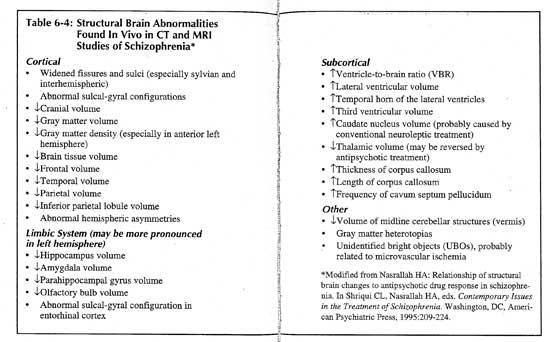
The central issues around mental disorders shift from an emphasis on changing neurotransmitter levels to trying to understand how and why these structural changes affect the resulting reality - and to provide an opportunity for each individual to create the best reality possible for himself.
Ultimately, the new model of mental illness brings with it more realistic hope than has existed before. Stigmatizing people with mental illnesses will eventually seem as cruel and silly as would looking down on others because of height, gender, race, sexual orientation, or other factors that they had no control over from the beginning. Developing environments that will give each person a chance to develop and function at his best will replace the search for the magic pill that will make the person "normal."

The role of early childhood experience in brain development will become increasingly recognized and respected. We already know that traumatic experiences during childhood can have dramatic effects on brain structure. Some developmental variables that are not as obvious - like the way families are structured, a sense of belonging to a social group, and the generation of expectations about how a life should be led- will also be appreciated for the way they change brain structure and functioning.
Even the presence or absence of societal rituals aimed at helping people through developmental stages, providing meaning in their lives, or reducing their anxiety may be recognized as having a role in the presentation of mental illnesses.
There is no question that our world is changing very rapidly. A way of life that had been relatively constant for centuries is being replaced by another - one that will, in turn, last for centuries more. The most important question facing our society right now is whether we're changing in ways that promote the mental health and independent functioning of our citizens. If, as a people, we're becoming more anxious, inflexible, or prone to mental illness that seems like the sort of thing that we'd want to know about.
Why should mental illness be increasing in our society?
It's puzzling to consider the fact that mental health problems in our culture are on the rise. Studies now suggest that one in five of our kids now have a diagnosable mental disorder. This translates to around 8 to 12 million kids. One in ten children have a mental disorder that qualifies as "serious" and only about half of them receive treatment for it. And the programs serving mentally ill adults, especially in our large urban areas, are becoming overwhelmed by the sheer numbers of people presenting for help. Something powerful and important is going on and just writing it off to more chemical imbalances in need of correction seems a tad inadequate.
Attention Deficit Disorder is becoming increasingly common now, affecting somewhere around three to five percent of children. Bipolar illness is being diagnosed in preschoolers. Autism diagnoses have skyrocketed. Children as young as three years old are receiving shock treatment. Any school nurse can tell you that the number of kids receiving psychiatric medications during the school day has grown dramatically in just the past couple of decades.
The reasons for these increases in mental illness among our children are unclear. As with any increasing mental disorder, psychiatrists will invoke the "improved detection" argument. We always like to claim that we've gotten a lot better at recognizing and diagnosing mental disorders that have just been there all along. But the idea that there were always so many of these mentally ill kids going unnoticed in our society before is hard for some of us to fathom. Child psychiatrists are pretty rare these days and those that exist don't have the time to be out in the field looking for new cases. Increasingly brief office visits centered on a quick prescription for medication are also unlikely sources of this improved detection of mental illness. It seems likely that something a lot more significant than improved psychiatric care is going on here.

Some theorists believe that a substantial portion of our citizenry's increased mental problems are likely to be related to the rapid and important changes that have taken place in our society. These days something like 70% of American kids are not raised in homes by a primary caretaker that stays with them. Only as recently as the 1950's that statistic was reversed; over 70% of kids were raised by stay at home parents, usually their mothers.
A central belief in the emerging model is that human brains develop and function differently according to the environments that they're developing in. It seems absurd to think that basic societal changes of this magnitude wouldn't be reflected in the way that our children's brains become physically structured, and in how those brains are able to function.
Growing brains
The simple analogy between developing brains and plants growing from seeds holds pretty well here. In fact the physical resemblance between neurons and plants can be quite striking.
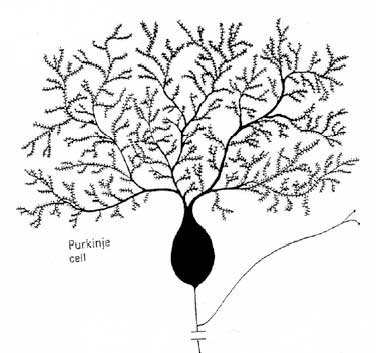
This is a simplified representation of an important type of neuron found in the cerebellum. Each of those little marks on the "branches" is intended to represent synaptic connections with other neurons. But in actuality, a neuron like this can connect with from 200,000 to a million other neurons. And those connections are ever changing depending on how much they are used. So the analogy with a living plant is even stronger than the diagram would suggest.
A number of factors influence the eventual health of the plant. Of course, the genes contained within the seed are tremendously important but they're only a part of the story. The seed must also be planted in the proper type of soil, in a certain temperature range, and with the right nutrients available if it is to have any chance of successful growth. Adequate sunlight and freedom from stressors such as toxins, dehydration, and infestations are also crucial to the plant's development. Alterations in any one of these factors can lead to stunted development, failure to thrive, or death.
Strangely enough, the requirements of the developing human nervous system are not as well understood as the needs of growing plants. The things that humans need are much more complex and difficult to study. But some answers are beginning to emerge. And our models of the human mind are taking off in unexpected directions with eventual consequences that we can now only catch a glimpse of.
Requirements of developing brains
Many of the things that humans need to develop a healthy brain aren't that different than what plants require. We must have adequate food, hydration, and protection from the elements. Sunlight is important for us too. But even these simple factors are not well understood.
It turns out that what we eat during childhood can have a pronounced impact on brain development. Human diets have changed quite a bit within just the past century. More fats, more processed foods, more food additives that we have no genetic experience in dealing with, and a lot more calories are common now. It's hard to sort out the effects of all these changes but that doesn't mean that brain development isn't affected.
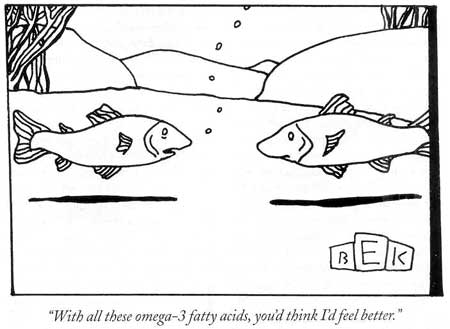
One area that has received some research interest lately is the impact of essential fatty acids on developing brains. Until pretty recently our diets had about an equal ratio of Omega III and Omega VI fatty acids in them. A shift away from fresh fruits, vegetables, and fish to diets heavy in red meats, corn oil, and processed foods has changed that ratio to more like 25:1 in favor of the Omega VI's. This basic change in the types of "essential" (meaning that we our bodies can't make them ourselves - they must come via diet) fats that we consume has had all sorts of far reaching effects.
Omega III fatty acids are a crucial component of nerve cell membranes and appear to affect their fluidity. Without enough of these fatty acids our nerves do not function normally - perhaps because the neurotransmitter receptors can't float in the membrane in the way that they should.
Dietary deficiency of Omega III fatty acids has now been linked to increased rates of depression, bipolar illness, dementia, violent behavior, and Attention Deficit Disorder. Mom's who don't get enough Omega III's during pregnancy are more likely to have infants with vision problems. In adulthood heart disease, strokes, hypertension, and inflammatory disorders are also increased when dietary Omega III's are inadequate.
The list of nutritional deficiencies that are being implicated in mental health problems is growing every day. Zinc, calcium, copper, iron, magnesium, and just about all of the B vitamins have been linked to a range of mental disorders and propensities for substance abuse. While supplementing adult diets with mega quantities of nutritional supplements may not produce the dramatic results that proponents claim, there is now little doubt that malnourished children are unlikely to form healthy brains.

All of this makes good intuitive sense. It's not much different than trying to grow tomatoes without the right sorts of fertilizer in the soil. The fruit just doesn't come out the same unless the right building blocks are available to make it. How could we possibly build optimal brains without the proper ingredients? But as yet there is no assurance whatsoever that American children will receive anything approaching a decent diet. It would seem to be wiser - and far more cost effective - for our society to spend a few dollars on good nutrition for our kids than to provide decades of expensive psychiatric care for them later on.
Of course we humans like to think of ourselves as a bit more complicated than plants. So it follows that developing a healthy person goes far beyond providing essential nutrients. A variety of social factors are extremely important in human brain development too.
The effects of toxins on brain structure and function
An expanding variety of substances are now being recognized for their detrimental effects on brain development. The toxin that has received the most study is alcohol. It's now certain that exposing the fetus to excessive concentrations of alcohol during crucial developmental periods can have profound consequences. This is just common sense. If those nerve cells are essentially drunk when they go through their extensive periods of replication, migration, and hook-up the results can't be positive.
Our mental health systems are now dealing with rising numbers of patients who suffer from Fetal Alcohol Syndrome or Fetal Alcohol Effects (where brain and emotional development are affected without the classic changes in the face and body). These kids are a tremendous challenge. They're often hyperactive, impulsive, have rapidly changing moods, show no capacity for empathy, and have enormous problems with behavioral control. We often misdiagnose them as having ADD or Bipolar Illness. They don't fit in well in our regular group homes and few specialized programs exist to care for them. Medications typically provide only marginal benefits.
Of course alcohol is just one of many toxins that our developing babies can be exposed to. We're only starting to learn about the effects of other drugs of abuse, such as cocaine, heroin, ecstasy, and methamphetamines, on brain development. Even our prescription drugs may have impacts that we haven't recognized. While SSRI antidepressants have been generally regarded as safe during pregnancy a recent study linked Paxil to heart defects. Performing good research on the effects of various drugs on fetal development is always difficult. Who wants their baby to be a research subject?
Another recent study may have profound implications for the mental health of our children. When blood from newborn babies' umbilical chords was studied an average of about 200 man made chemicals was found in it. We now live in a chemical world that's very different than the one we had even a hundred years ago. Our genes have no experience in dealing with these new compounds and it's very hard to study their effects.
When chemical exposure affects observable features like muscle control or physical development it's easier to draw cause and effect relationships. But what would we expect to find if a chemical was influencing the development of high level human functions like those involved with creating self-concepts, stable moods, or control of basic impulses?
The answer, of course, is that we'd experience an increased frequency of mental disorders but wouldn't know why this was happening. We'd see more kids with behavioral problems. More mood disorders, more attentional problems, and more anxious children. Substance abuse and other impulse control problems would increase as development of that "Hippocampus" based mode of emotional processing suffered and there was a shift back to "Amygdala".
The psychiatry field has always had problems separating out correlation and causation. When we must make inferences about what's going on between the ears of another all sorts of goofy conclusions can be reached. But it does seem incredibly naive to think that exposing our kids to powerful toxins during their brain development wouldn't have an effect on how they turn out.
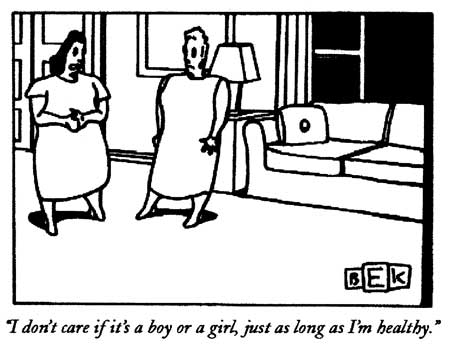
The importance of the mother's own hormones and other internal chemicals on the brain of the developing fetus is another area that's received little attention. But there are several studies out there linking traumatic emotional experiences in the pregnant mother with an increased likelihood of the child eventually developing schizophrenia. Once again it looks like excessive stress hormones can have profound effects on brain structure.
It's also suspected that changes in the Mom's hormones can affect the process of the baby's brain attaching immune markers to nerve cells that allow them to recognize each other when they're supposed to connect. If those markers aren't set right when the reorganization of the brain takes place in late adolescence all sorts of problems can occur.
These are obviously crucial issues for our society. Every time we fail to identify a preventable case of mental illness we have to spend lots of money caring for the individual later on. But devoting sufficient research dollars and developing programs aimed at preventing these disorders will require a greater degree of wisdom and commitment than we're typically finding in our public health systems these days.
Better attention to the chemical and hormonal environments that our children's brains develop in will have to be an important part of mental health systems of the future. Creating future generations of citizens that are as mentally healthy and functional as possible should be a national priority.
Empathy and brain development
A number of child psychoanalysts and psychologists have written about the importance of empathy in human social and intellectual development. Empathy refers to the ability to understand or resonate with another person to a degree that we can begin to comprehend what is in their minds. Empathy is one of our species' most significant achievements. Its development requires both intact genes and a good environment. Some of us believe that empathy is the hardest human trait to nurture and the first one to go when brain problems develop. Without empathy our similarities to our primate relatives become all too apparent.
The development of empathy requires the presence of a loving, emotionally "attuned" caretaker during the child's development. Fascinating experiments have been done to look at how babies and their caretakers really communicate, and what they are communicating about.
Attuned caretakers can sense the emotional state of the infant and respond to changes. Parents will, often unconsciously, match up their facial and verbal reactions to the babies emotions. For example when a baby is happy and excited Mom's voice may rise. She may change her facial expression, say something like "wheeee", or even move the child up and down in a way that resonates with the baby. Over time the child learns, through these sorts of interactions, to form very basic ideas about itself and other humans. We must learn things as simple as where we leave off and the other person begins. Other concepts such as trust in others and a basic belief in one's self worth also depend on these early interactions with emotionally attuned caregivers.
An entire school of thought called " Attachment Theory" devotes itself to studying the effects of these early bonding interactions with caregivers on eventual personality development. There is little question that many of the observed differences in human personality, anxiety tolerance, mood stability, and self-confidence must be rooted in biological changes in the developing nervous system that are, in turn, based on the quality of the childrearing that a child experiences.
Another way that the care of the child becomes reflected in its brain development involves stress responses. When babies come into the world they have "raw" nervous systems. Their brain cells have not yet developed their full coat of insulating myelin. Intrauterine life has not prepared them for dealing with any sorts of stress or frustration. In a very real way, humans are born without the capacity to soothe themselves. We must count on others to provide that vital function initially, and to eventually help us to acquire it for ourselves.
When babies don't have that attuned caretaker to sense their distress and comfort them the painful feelings continue to mount. Eventually what has been referred to as a "catanoid reaction" occurs. The baby's nervous system essentially shuts down in an attempt to manage the negative feelings. If that process happens often enough there will be fundamental changes in the way that the brain's emotional apparatus develops.
In addition to relative freedom from stressors, the developing child's brain needs all sorts of stimulation. Physical touch and awareness of the body are important. Even something as basic as crawling is now recognized as vitally important in brain development and the coordination of the two hemispheres.
Children require environments that support their creativity and sense of curiosity. They need to know that they can explore their little worlds, safe in the knowledge that their caretaker will be there to welcome them when they return. Acquiring a basic trust in others depends on these early relationships.
A concept that we don't often give much thought to is that of "affect differentiation ". The basic idea here is that humans are not born with a full repertoire of emotions. Babies are thought to have just two basic emotional states at first - sort of a primary pleasure state and one of distress. It's through experiences with emotionally attuned others that the limbic system - our emotional apparatus- develops its complexity.
Healthy humans can experience a full range of emotions - from rage to anger to irritability to mild annoyance, for example. Ideally, similar gradations and nuances of feeling should develop for all of the emotions. But that range of emotional responses doesn't happen without timely and sensitive responses from caregivers. Without that kind of support during brain development people are left with stunted emotional systems. They're likely to experience a limited range of emotions but the ones that they feel may be experienced with too much intensity.
A crucial feature of healthy brains is the ability to keep emotional reactions from escalating. One of the characteristics of poorly functioning brains, regardless of what has gone wrong with them, is that once strong emotions are activated they continue to mount until they are discharged in some sort of physical action or another human steps in to intervene.
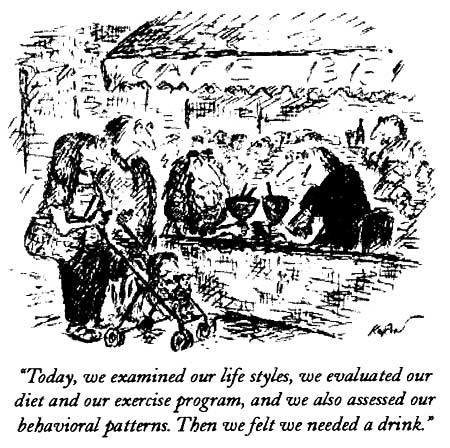
Healthy people can also control the impulses arising from their emotions. We can channel our energies into work, play, or other activities of our choosing. While this seems like a very basic talent, it's one that's not well developed at all in children who have been exposed to trauma or neglect. Good examples are seen in people suffering from Borderline Personality Disorder. They typically cannot soothe themselves when they're anxious. Their emotional reactions are extreme and all or none in quality, without apparent "shades of gray". Their emotional system appears to "have no brakes". And, despite normal intelligence, they can't put their energy into work or play like healthier people do.
Children must count on their caretakers to provide them with an external world that is safe, responsive, and sufficiently stimulating. There is no way a child can do this for himself.
Those dreaded "Borderlines" often highlight this crucial issue of brain development. Many of these people have been subjected to severe abuse during their childhoods, often sexual in nature. When children are traumatized there are resulting brain changes. For example, their hippocampi are often smaller, with important effects on memory and emotions.
One intriguing finding about abused children is that at least a few of them still seem to develop normally despite the trauma. We suspect that some of this resiliency is dependent upon the presence of other empathic caretakers in their lives. In fact, one could speculate that some of the results of sexual abuse or other trauma perpetrated by caregivers is not directly mediated by the trauma alone.
Perhaps some of the damage comes, instead, via the absence of an emotionally attuned caregiver in the child's life. An adult that is capable of experiencing genuine empathy could never treat a child in such terrible ways. Resonating with the child's terror should make that sort of abuse impossible. And empathic parents that are truly sensitive to the child's emotional state could not knowingly let something like that go on at the hands of another without intervening either. So sorting out the effects of abuse from the absence of empathic caregivers may be a very complicated process.
The bottom line is that changes in the structure and functioning of our family systems are bound to have an impact on the mental health of the children coming out of those families. If we're going to continue to move away from the close-knit, extended family groupings that characterized human culture for thousands of generations we'll have to find other ways to provide those developing brains with the crucial things that they require.
Or we can just treat the needs of those kids as an afterthought and try to pick up the pieces later with expensive social programs and layers of medications aimed at calming them down enough to function in a fast-paced society that their brains aren't equipped to deal with. It's not like we don't have a choice.
Other things that humans need to become emotionally healthy
Children must have a lot of other needs met if their brains are to develop optimally. All humans require physical exercise for healthy brain functioning. We need those challenges for the memory and problem solving parts of our brain. Laughter and imaginative play are turning out to be extremely important. And finding healthy ways to give expression to our deep-seated aggressive and sexual drives is essential, especially as we enter adulthood.
Prolonged and excessive boredom appears to be toxic to human brains. But not just anything that captures our attention or keeps us entertained will be sufficient to help us build or maintain healthy brains.
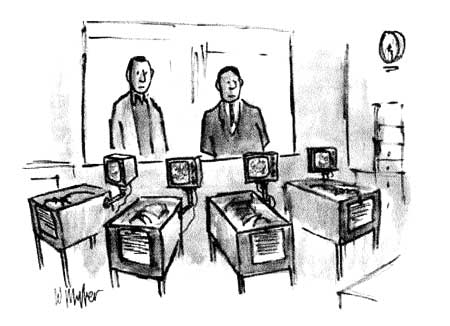
We still don't understand the effects of the countless hours that many children spend watching images moving on electronic screens. Some children now spend most of their waking hours watching TV, playing video games, or on the computer. This is brand new in the history of human culture and to think that it wouldn't have an effect on the types of brains that our children are developing seems ridiculous.
Studies have shown what many would intuitively expect. There is a real association between the amount of time spent watching TV and a child's ability to pay attention, concentrate, and control impulses. A study in the April 2004 issue of Pediatrics found that for every hour of television that a child watched per average day between the ages one or three there was a resulting ten per cent increase in the likelihood of their having problems with attention at age seven.
The study of how environmental variables affect children's development is a rapidly growing science and all sorts of issues besides brain structure are being studied. These studies are often hampered by a crucial problem though. When one looks at a factor like how much TV a kid watches to see how development is affected there is always that other critical question: What would the child be doing if he wasn't watching TV? And what are the effects of not doing those things?
The genes that have been selected for when creating the "modern human" were those that were most adaptive in an environment that was relatively unchanging for thousands of years. We had a different diet and spent lots of time in physical activities. Perhaps much of the increasing rate of mental illness in our society ultimately reflects difficulties in adapting to a world that is changing far more rapidly than our own genetics will allow us to keep up with.
Many of the factors that appear to negatively affect people's mental health are seen with the greatest frequency in American children. Certainly we have led the way in creating diets that are very different than those seen in other times, or in other parts of the world today. It seems clear that few, if any, other countries use the television or video games to occupy their children to the extent that we do. We're the leaders in turning our kids over to overburdened and distracted strangers for their childrearing. Nobody is quicker with the handgun than us. These are dubious accomplishments.

No one is faulting the parents themselves for these societal changes. America has evolved in such a way that it's often very difficult for even dual income families to get by financially. Just obtaining decent housing, adequate food, and basic health insurance can be an almost insurmountable challenge for many people in our culture. Single working Moms are on the rise and they, obviously, must rely on day care providers in many cases.
Many parents come home from a hard day at work and still find the time and energy to give their children the affection and attention that they need. The kids turn out OK because of the sacrifices that their parents make for them day in and day out.
But we should also take a hard look in the mirror and realize that in a lot of cases things are not turning out OK for our children. Many receive far too little in the way of real nurturance. Some parents don't have the energy or the willingness to make those sacrifices. Others are so limited by the results of their own upbringing that they can't provide the crucial things that their children need if they're to have a fighting chance at becoming healthy, functional adults.
Some of us have even suggested that there are now two types of Attention Deficit Disorder in our society. One involves very real brain changes and often responds nicely to drugs that stimulate under-active attentional centers. The other results from too little attention being paid to the developing child.
Things are handled very differently in more advanced countries than our own. Lengthy paid maternity leaves are common in many European societies. More financial support to stay at home during the children's developmental years may be available. There is often more flexibility around work schedules. Better day care programs exist, most of them subsidized and some of them right at the workplace.
If our goal is truly to create a society of healthy, functional people that work and make meaningful contributions to the common good there is nothing that we can invest in that is as important as the development of our children.
The seed is crucially important too
The focus to this point on environmental variables is, hopefully, understandable. These are the factors that we have the greatest chance of studying and impacting. But any look at mental illness in our society would be lacking without some mention of the genetic elements involved.
Even Attention Deficit Disorder, though its frequency is increased by dietary and environmental factors, is still a problem with a very strong hereditary basis. It looks like at least half of identical twins will develop ADD if their twin has it. Similar inheritance patterns are present for many of the other mental disorders.
Schizophrenia is the most severe and devastating of the mental illnesses that affect our young adults. In fact it's a disorder that classically strikes people in late adolescence and early adulthood. This seems like a cruel irony. Just as the young person would normally be moving away from their parents to establish an independent life of their own they become ill and can't negotiate that transition. Many have speculated that it might even be the stress of leaving home that causes people to become ill with schizophrenia at this time in their lives. But this is another area where modern neuroscience has turned conventional ideas about cause and effect on their ear.
Schizophrenia is appearing to be a disorder of neuronal migration and hook up that originates during the first two trimesters of fetal development. Some nerve cells just don't migrate to where they're supposed to go or connect properly with other nerve cells. Some of this altered migration may be caused by complex changes in the ways that groups of nerve cells "decide" where to move to.
The brain is highly responsive to environmental variables even during fetal development. In the fetus that environment is enormously determined by hormones circulating through the bloodstream.
Some hormones, like testosterone, have a powerful direct effect on nerve cell migration. Others may exert their effects via effects on the developing thymus gland. The thymus is involved with immune responses, including the tagging of nerve cells with markers. Those markers are involved with the migration of neurons and allowing them to recognize which other nerve cells they are to connect with.
It's becoming clear that even though children who will later develop schizophrenia may look pretty "normal" and be free of overt symptoms, their brains have been structured abnormally since before birth. But the characteristic symptoms don't typically emerge until later.
During normal early adulthood there is a massive reorganization of the brain as it begins to take its adult form. A process called "synaptic pruning" takes place. Some neural elements are eliminated, others become more robust. But recognizing which neurons are to be done away with is a very complex process too, one that likely depends on the accurate laying down of those nerve cell markers during fetal development.
We've learned that young people with schizophrenia often have dramatic changes in their brains when the illness strikes.
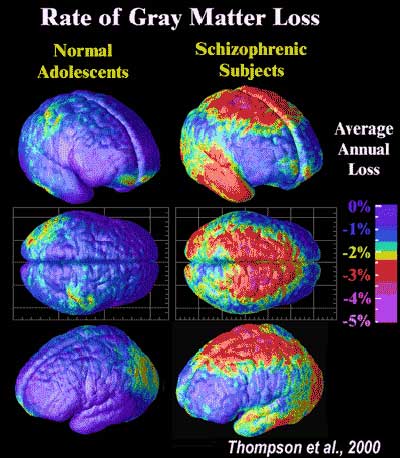
This slide demonstrates some of the areas where gray matter is lost when schizophrenia affects young adults. It may be hard to really grasp the full implications of this. Maybe the best analogy comes from computers.
In computer terms the term white matter basically refers to wiring that carries electrical impulses from one area to another. White matter is "white" because it has a layer of myelin that insulates it from surrounding cells. Just like the coating on wires used to transport electricity in our treasured electronic devices.
The "gray matter" that is lost in schizophrenia is not wiring. Using our computer analogy the gray matter that is being lost represents "processor". So the effects on complex higher intellectual functions can be devastating.
With the onset of schizophrenia there is typically a large drop in IQ. Memory of all sorts can be affected. The ability to think, imagine, or solve problems declines. The process of deciding what is "out there" in external reality versus what originates within one's own imagination can go horribly awry. Cause and effect relationships become blurred. " Negative Symptoms" can develop. And that most crucial of human constructions- the very "sense of self"- can totally breakdown. All of these terrible things typically take place just as the young adult is supposed to be negotiating that move towards independence.
So perhaps mentally healthy young people begin to separate from their parents precisely because their brains have reorganized into their adult form, allowing greater independence, problem solving, and self-identity. And schizophrenia is a result of problems in that very reorganization process. The fact that these young clients would have enormous difficulties in becoming able to live independently is not at all surprising. This has nothing to do with laziness or entitlement or even drug abuse, no matter how willing our society is to attribute problems to those factors.
What does being mentally ill mean for individuals?
For humans, optimal environments must allow us to feel that we have some degree of control over what happens to us. Without this we're bound to experience anxiety and discomfort. Our mentally ill citizens do not routinely have access to this sense of self determination. The core beliefs that our society has held about mental illness have routinely resulted in a reduction of both their legal rights and their responsibilities as citizens. Social programs, residential facilities, and even hospitals often treat mentally ill people as though they are a second class of human.
A natural tendency among humans is to believe that people who are different than us are somehow less human than we are. Without the power of this mental mechanism we'd have a hard time killing other humans that are seen as enemies, much less their innocent children.
When someone on a local editorial page suggested that we've come to view people in the Middle East as being less human than Americans another writer responded by angrily asserting that those people are less human than us. Perhaps that gentleman should travel more. An inescapable conclusion when people visit other cultures is that humans are pretty much alike everywhere. They may have different languages or religious beliefs but as we go about our day to day lives the differences are pretty minimal.

The unfortunate result for mentally ill people is that we also extend these types of beliefs to them. Because they seem different from us we may conclude that they're less human than people who don't have suffer from mental illness. And when we conclude that any group is less human than ourselves all sorts of terrible treatment can be "justified".
Compounding matters is a tendency on the part of mentally ill people to be consumed with self-loathing and to believe that they somehow deserve to be treated badly. As Nietzsche pointed out, " terrible experiences make one wonder whether he who experiences them is not something terrible ".
Having a severe mental illness in this country can mean that getting decent care for your disorder will be very difficult. Many health plans "carve out" treatment for mental illnesses as though people who suffer them are less entitled to care than people who have "physical problems", despite the now obvious fact that these mental disorders are every bit as "physical" in origin as any other. There is really no assumption that people have a basic right to effective treatment for their mental disorders anymore, much less a say in who will deliver that treatment or what the treatment will look like.
In the public sector our mentally ill people pretty much have to take or leave whatever treatment is offered to them. They seldom experience much choice in who their providers will be or how often they'll be able to access them. Other people may tell them where to live, whether they'll be able to work, who they should associate with, and how they should spend their time. A refusal to "go along with the treatment plan" can result in all sorts of negative consequences, even if the client didn't feel like it was really their plan to begin with.
A decision to try living without medications is almost never supported, even if the person is deemed competent to make other life decisions. Nursing homes and other crowded group facilities have become reliant upon antipsychotic medications to keep the clients calm and mannerly. Oftentimes we react as though going off psychotropic medications is tantamount to a criminal offence.
And here in Minnesota there are just two groups of people that are entirely banned from choosing whether they will smoke tobacco - mentally ill people in State hospitals and inmates in our prisons.
Whenever we take basic rights away from mentally ill people we're likely to justify it with a paternalistic attitude which holds that we know what's best for them. It's very easy to overlook who's life it is that we're dealing with.
With rights come responsibilities
The law in this country is pretty clear on the issue of people's rights. Mentally ill people are supposed to have the same rights that other people do unless there have been specific legal mechanisms to reduce those rights. Usually the reduction of rights is supposed to be temporary and must be justified by some dangerousness to themselves or other people.
The same holds true for people's legal responsibilities. In most states mentally ill people are held legally responsible for their behavior with just a few exceptions, as when someone is so out of it that they truly don't know what they're doing. But our society treats these people very differently in practice, sometimes excusing behaviors that are not a direct result of mental illness and at other times incarcerating them for what are clearly symptoms of their disorders.
When police are called to psychiatric hospitals to see patients who have broken the law there are often no consequences at all. The cops decide - on the spot and with no training - that the mentally ill person must not be competent enough to be held responsible for his own behavior.
We're now seeing people use complaints of mental illness to avoid legal consequences of their misbehaviors. Many offenders have learned that they can get transferred from jails to hospital psychiatric wards by acting strangely or saying that they're suicidal. Some of those people actually have mental illnesses, others don't.
When individuals do get in front of a judge their consequences may be very different if the magistrate decides that mental illness is involved. Sometimes being sent for mental health or chemical dependency is viewed as punishment enough. One of the most objectionable failings of our criminal justice system occurs when judges count time spent in mental health facilities as "time served" against a criminal sentence.
Part of these practices result from the arbitrary choice that is forced on our judges and police officers when mental illness and illegal behaviors intermix. There are usually no options besides sending people to prison or shuffling them off to the mental health system and the mental health route seems like the most humane and appropriate. Places that can deliver supervision, consequences, and treatment for mentally ill offenders are very rare. Our society has a crying need for specially designed facilities that address the needs of both the criminal justice and mental health systems.

On the surface it would seem like being able to use symptoms of mental illness as a "get out of jail free card" would be pretty handy. But the strategy can eventually backfire. The same types of behaviors that were previously overlooked or just resulted in a "sentence" of mental health treatment can be harshly dealt with by a new judge or a more aggressive prosecutor. It's no coincidence that we have far more mentally ill people in prisons than we do in psychiatric hospitals.
But the real problem with a system that doesn't hold mentally ill people responsible for their actions - like other people - is that there is an associated reduction of rights to go along with the assumption of limited personal responsibility. Anyone with a severe mental illness knows that their basic human rights can be trampled on at any time and there isn't much they can do about it.
Mentally ill people routinely lose their housing or are kicked out of treatment programs for using alcohol or marijuana - activities that would have few or no consequences if they were not diagnosed with mental illness. The right to receive adequate notice of eviction from one's residence - typically thirty days for the rest of us - is frequently not extended to mentally ill clients.
When these clients do misbehave they're frequently hauled off to emergency rooms and hospitalized against their will, only to learn that they've also lost their bed in whatever group home, apartment, or shelter they were living in. In fact our group home system depends on people opening up vacancies in just that manner. The number of times that a staff worker with no legal or mental health training beyond that available from a couple years of college is allowed to serve as both judge and jury in the lives of these severely ill people is mind-boggling.
The emerging model holds that this is not a situation where mentally ill people have something wrong with their nervous systems while the rest of us have brains that are optimally configured. Just about everybody has something wrong with their nervous system. Human brains are just too complex to get everything right all of the time. The fact that mentally ill people have relatively more brain problems than the rest of us does not mean that they shouldn't enjoy the same rights - and responsibilities - that other people do whenever possible.
The right to be judged according to what one actually does - rather than what he says or believes - is one of the most basic rights of all. Not holding people responsible for the consequences of their own actions, no matter how well-intended this may be, is not really a kindness.
Providing a range of legal consequences that fit the actions and situations of mentally ill people will be a challenge and will require collaboration between the courts and our mental health systems. We'll need to develop new facilities and programs that draw on the strengths of both systems. But we can't really expect progress towards the goal of maximizing the rights of mentally ill people until we come to terms with holding everyone responsible for their own behaviors, regardless of how well their brains are configured.
The emerging model and psychotherapy
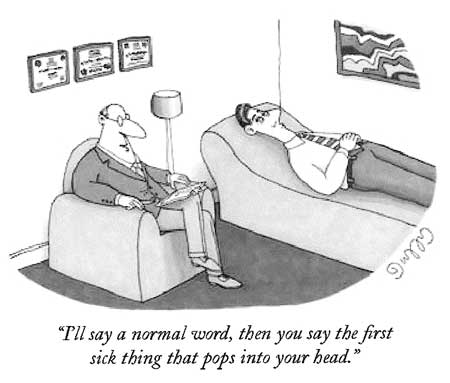
One of the encouraging things about the emerging model of mental illness is the way that it dovetails with the findings of the psychotherapies. The chemical imbalance model has often forced an arbitrary division between various mental health disciplines. Even we psychiatrists are divided into the "biological psychiatrists" and a group made up of everybody else. Psychiatric training programs have become increasingly "biological" over the past several decades, to a point where some new doctors look upon psychotherapy with a smug condescension.
The irony here is that the focus on changing the brain chemistry of mentally ill people has allowed us to change some things about humans relatively rapidly, without having to actually understand anything about them as individuals.
Psychotherapeutic models are much better at understanding people but nowhere near as able to effect rapid changes. In our society changes that occur quickly will always win out over gradual ones, even if the gradual ones are more effective and long lasting in the long run. The demand for instant gratification is an increasingly important part of our national character.
The three main schools of psychotherapy seem to fit very nicely with what we've learned about the brain through neuroscience research. Cognitive Therapies focus on the importance of beliefs and expectations in determining the realities that we live in. Nothing could be more consistent with this developing model.
Creating pictures of reality through incoming sensory stimuli and via our world of thoughts are both dependent upon the symbols that we have developed and stored in our brains. These symbols, including basic ideas about ourselves, our self-worth, other humans, and the very meaning of existence are all organized according to our beliefs. Beliefs are the filter through which we arrange our worlds and respond to them emotionally.
Changing belief systems allows us to create a different reality, and to respond to it differently. This process of changing the organization of the very symbols that we use to assemble our realities may be slow but it must be just as rooted in actual brain changes as any medication therapy. Our technology is only recently advancing to a point where this is becoming obvious.
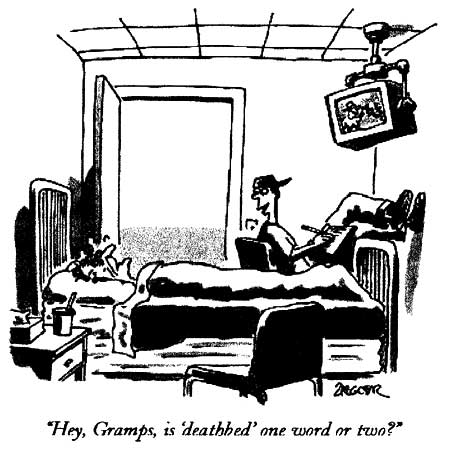
Ego Psychology deals with the ways that brains protect themselves from unpleasant emotions. One of the curses of being human is the fact that we are (probably) the only animals that are consciously aware of our own mortality. The emotions arising from this fact, along with those related to the many challenges to our self-esteem that occur during everyday life, must be dealt with in some fashion or we cannot function. "Defense Mechanisms" allow us to cope with the painful emotions so that we can turn our attention to other things.
"Higher Level" defense mechanisms leave the basic picture of reality intact. Mentally healthy humans can laugh at their own foibles, channel energy into work or play, or simply decide to put unpleasant thoughts out of their mind for the time being.
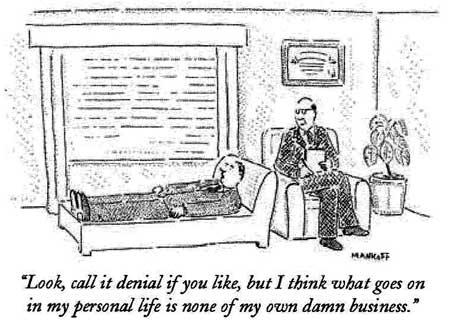
When the brain systems involved with attaching emotions to thoughts and experience are not working optimally, one sees distortions in the representations of reality or the image of the self. Basic facts can be denied completely. Unacceptable feelings and aspects of the self may be perceived as originating in the outside world rather than from within. Representations of other humans can acquire inflexible, all-good or all-bad qualities. The excessive use of the less healthy defense mechanisms carries the cost of disturbed relationships with other people, increased anxiety, and many other areas of impaired functioning.
An important but often overlooked facet of human behavior is our capacity for generating comforting thoughts. From the very first time that we learn to soothe ourselves with the thought that "Mommy will come back" we utilize thoughts that are designed to bring us hope and ease our anxieties. Each of us has our own repertoire of thoughts and memories that we can turn to in an effort to feel better. Fantasies of romantic conquests, wealth, being admired, and high ranking in our social groups are common themes in the thoughts that we rely upon to produce positive emotions within our own brains.
The problem is that this unique human ability to generate thoughts that make us feel good is reinforced by brain chemicals that have an addictive quality. The more we turn to thoughts and memories to feel good, the stronger is our tendency to live in our inner worlds. This tendency to keep attaching positive emotions to images of ourselves also opens us up to despair. Humans can't help but compare current representations of ourselves to underlying idealized images of how good we think we should be.
The greater the disparity between the genuine image of our self and the idealized version, the more severe are our feelings of depression and existential pain.
Our relationships with other humans are, ultimately, the most important factors that determine our mental health. Object Relations is a branch of psychotherapy that focuses on the development of the neurological symbols for the self and other people. Just as those newborn kittens must develop symbols for things as basic as horizontal and vertical through experience, we build symbols for self and other through our interactions with our caretakers.
Core relationship patterns involving images of ourselves, important people in our lives, and the emotions that link us are repeated over and over throughout our existence. The options are limitless but common patterns involve feeling that we're small, under- appreciated, and that we must hide our true natures from more powerful "grown ups". Anyone who has looked in his rear view mirror to see a police car knows how powerful and deeply rooted are our feelings around authority figures. In a recent speech given to police officers a strong suspicion was confirmed: Even cops experience that brief moment of panic when they see a squad car following them.
Our process of socialization depends on the fear of disapproval and its consequences. Even mature adults often show a tendency to respond to other people as though they're important but withholding sources of potential love, admiration, and support. Emotions of shame, resentment, and a desire to be recognized as special are common emotional links between these images of self and other. Freud's concept of the repetition compulsion - our innate drive to recreate relationships based on early patterns of interaction with our caregivers - is one of his theories that has stood the test of time.
Common elements of all therapies
Many non- specific benefits of psychotherapy take place regardless of the theoretical orientation of the therapist. The increase in hope and the expectation that improvement will occur are powerful contributors to any therapy. Studies have found that patients often experience significant improvements even when they're on waiting lists to begin therapy. And being in the presence of someone who can see us for who we really are - warts and all - and still respect us allows us to become more tolerant of ourselves.
All of the psychotherapies involve a process of becoming aware of the guiding beliefs that underlie our moods and our more acute emotional responses. With time we can become better at understanding where these emotions come from and in using them as sources of information about ourselves. Assuming that our problems are understandable and that we can do something about them is at the core of all therapies too.
Some of the brain rewiring that occurs during psychotherapy undoubtedly occurs in strengthening connections between "Hippocampus" and the frontal lobes. The capacity to step back and observe ourselves increases. Revised symbols for self and other are laid down in the memory banks and become available for imagination, recollection, and self-representations.
With increased self-reflection and understanding we become neurologically more flexible in the ways that we can interpret our experiences. Longstanding patterns of interacting with other humans become less rigid and stereotyped. Our enormous sense of self- importance can occasionally give way to genuine concern and affection for other people. We begin to have more conscious input into how our lives are conducted.
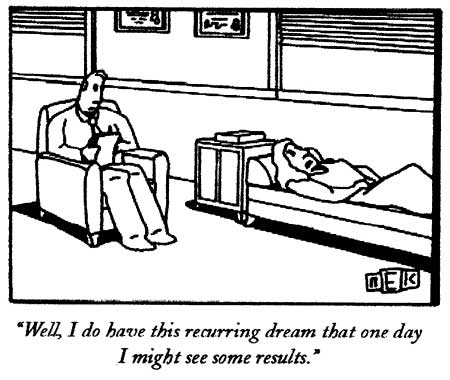
Recognizing the legitimacy and importance of psychotherapy does not mean that psychiatry should abandon the gains that medications can sometimes produce. Some of the more structurally based mental disorders, like schizophrenia, can make the process of self-reflection and understanding tremendously difficult.
When the only tool you have is a hammer every problem starts to look like a nail
Once people have an established mental illness, whether it results from genetics, prenatal factors, or problems in their early development, we psychiatrists have, for some time now, simply attributed them to chemical imbalances and prescribed medications.
In many illnesses medications may be essential for the brain to approximate some degree of normal functioning. But these drugs don't permanently repair the underlying structural problems, nor do they truly correct some undefined "chemical imbalances". At best they restore a better equilibrium between the parts of the brain charged with creating representations of the self and the world, and with those areas involved in our emotional responses.
These drugs may slow down input from the senses and thoughts enough that the brain can be less overwhelmed and disorganized. Our medications may help to turn on genes responsible for making new brain cells in the hippocampus and keeping that system healthy. They may temper the responses of overly excitable neuronal systems in mania, regardless of its cause. Improved sleep may be a common pathway through which many of our medication treatments are mediated. But as yet we do not know for sure how or why any of our psychotropic medications actually work.
To advocate for the abolishment of psychotropic medications would be just as senseless as assuming that medications are the answer to all human problems. Whenever any person or organization assumes extreme positions of this nature some reality distorting and the creation of an artificial sense of certainty must be involved.
The point is that psychiatry and our society seem to have swung too far in the direction of demanding quick medication fixes for all problems of brain development and structure. Our current mental health system frequently puts people in situations where their nervous systems cannot possibly work well, then tries to correct the situation with massive doses of medications. This may be good for the pharmaceutical companies but they're the only ones that are truly benefiting from this system of care.
It would make better sense for us to provide mentally ill individuals with all of the environmental factors that give their nervous systems the best chance at decent functioning, then to see what sorts of medications are needed and in what amounts.
Our attention should shift to considering which variables in the environment can be manipulated in ways that will give those mal-developed brains their best chance of functioning well. Creating specially designed, enriched environments for those with severe mental illnesses will likely be more cost effective in the long run than relying on medications alone. Meaningful work, privacy, security, good nutrition, and decent relationships in which they're not stigmatized or looked down upon are essential commodities that many of our patients will not be able to acquire unless we help them.
An example of how things come together
Since it's so hard to tell when environmental factors are affecting high level brain functions let's look at a more observable example of how chemicals and beliefs can interact. It's easier to see problems in the brain areas involved with muscle control than those involved with moving symbols.
Parkinson's Disease is a neurological disorder characterized by tremors, muscle rigidity, slowed movements, and balance problems. We know that an area of the brain called the substantia nigra is affected in Parkinson's. The substantia nigra is smaller than a little fingernail but has over 200 known neurotransmitters in it. Chief among its roles is the manufacture of dopamine. When it produces too little dopamine the characteristic symptoms of Parkinson's Disease inevitably appear.
Imagine that a loved one begins to show pill-rolling tremors of his hands and his face becomes progressively mask-like. You bring him to a neurologist. Parkinson's Disease is diagnosed. A dopamine boosting drug is prescribed. The symptoms get somewhat better. Everybody feels pretty good about the diagnosis and treatment. But problems emerge if the situation is studied more carefully.
It turns out that there is a long list of man made chemicals - mainly pesticides - that cause Parkinsonian symptoms. In fact, more cases of Parkinson's Syndrome are now attributed to chemical exposure than the good old-fashioned Parkinson's Disease that humans suffered from for centuries. So your loved one likely developed his severe neurological disorder in response to his environment, especially is he was a farmer or gardener.
Many people in this situation may feel anger towards the politicians that we pay big salaries to. After all, if protecting people from exposure to toxic chemicals isn't a function of government what is? We create governments to provide the things that we can't do on our own. The tasks of establishing roads, schools, and safe environments to raise our kids in are just too big for individuals.
You may feel outrage about what's happened to your loved one at first. But if you believe that an individual person is powerless to do anything about the pesticide problem the anger may quickly give way to despair. Helplessness may feed depression. Worries about other people experiencing similar fates may become excessive.
Depending on your own mental health and character structure you may utilize a variety of defense mechanisms to deal with all of the emotions that come up. Hopefully, you'll be able to put troublesome thoughts out of your mind, focus on work and other activities, and not let the situation grow out of control. But some people will react to a stress of this nature by distorting reality. They may come to believe that toxins are everywhere and become obsessed with cleanliness. A few will even conclude that there is a conspiracy at work to damage the brains of innocent citizens.
You may end up seeing a psychiatrist yourself. Ironically, if things get bad enough and you have the wrong insurance, you could conceivably end up receiving a medication that causes Parkinsonian side effects. The major tranquilizers like haldol, prolixin, and other older, cheaper antipsychotics are well recognized for their ability to induce a Parkinson- like syndrome.
Your reactions to the government officials that allowed the unfettered pesticide use - perhaps related to donations received from powerful chemical industry lobbyists - will be largely influenced by the interactions you had with your parents during childhood. Every American is likely to give lip service to that " all men are created equal " idea but when it comes to our relationships with people in authority or celebrities we're much more likely to respond as though we're kids in the presence of grown ups.
Our tendency to see other people as better than ourselves can seem cute in some situations. We react to whoever the entertainment media has decided is the starlet of the day as though she is qualitatively different than the girl working down at the corner convenience store. The movie star is seen as more sexually desirable and her actions are viewed as more important. We may even attribute importance to the political opinions of people with modest IQ's and no capacity for serious thought, just because they appear on television.
This innate pattern of forming relationships in which one person is seen as superior to another carries all sorts of far-reaching effects though. Anytime a person feels inferior to someone you can bet there is someone else that they feel superior to - and vice versa. The people that look up to their leaders as though they're demigods are also the ones that are most likely to look down on other humans as being less human than themselves. Racism and stigma always spring from personal insecurity.
Our tendency to see political leaders as divine rulers is at the heart of the reason that your loved one got the Parkinson's in the first place. When we hear about influence peddling and corruption we react with dismissive shrugs. When politicians vote to exploit the environment or allow the use of toxic chemicals so that large corporations can see greater profit margins we look the other way. We unconsciously view things from the perspective of a child who has no control over the actions of the parent.
When we truly see other people as no better and no worse than ourselves we can maintain some perspective on the relationship. It becomes reasonable to expect - even demand - that politicians act with the common good in mind. What else are we paying them for?
The rationale for change
It's always tempting to advance moral arguments in favor of the types of changes that have been suggested here. When a person has been around poor and disadvantaged people for a long enough time those ethical points of view can be extremely compelling. And these moral arguments work well on other people that have similar backgrounds and experiences as us so it's natural to assume that they'll make sense to everyone else.
But our understanding of, and sentiments towards, people that seem different than us are, ultimately, impossible to separate from our feelings about ourselves. And those are very hard to change. People that, at their very cores, don't believe that their own lives are worthwhile or meaningful will not be touched by arguments that are based on ethical assumptions about the value of the lives of mentally ill people.
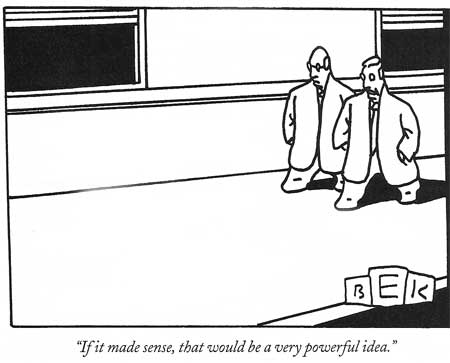
The more persuasive arguments for change that arise from the emerging model of mental illness must be based on a realistic appraisal of human nature. When we more fully understand what it means to be mentally ill and appreciate the kinds of things that the people suffering from these disorders need to function more independently it will make sense to redefine the basic safety net that our society provides for its most disadvantaged and marginalized citizens.
The arguments in favor of efficiency and cost-effectiveness will prove most convincing over the long haul. It will be much cheaper in the end to provide a true safety net that will catch everybody than to maintain one that's full of holes, then keep spending lots of money on the people that the net didn't catch. And people need to know how far they'll drop before the net will catch them. When everyone can count on receiving the basic essentials necessary for a decent quality of life the decrease in those stress hormones will be almost palpable.
The real implication of the model of mental illness that is now emerging is that we're going to have a great many mentally ill people in our society whether we like it or not. They aren't going to go away when some new and better medication comes along. Mental illness is in our genome and may be increasing because of ways that our society is evolving.
Recovery from these disorders will not come in the form of a capsule alone. Even when the medications work at their best there will still be residual problems that many of these people won't be able to negotiate on their own.
Creating safe and humane living environments for the adults that suffer from these disorders - environments that provide actual opportunities and incentives to function as independently as possible - will be more effective than continuing a system that promotes dependency and dysfunction. Providing a "good enough" environment for our children as they develop their brains will reduce the number of people that will eventually depend on society to support them.
Is there any part of the political spectrum that's opposed to these outcomes?